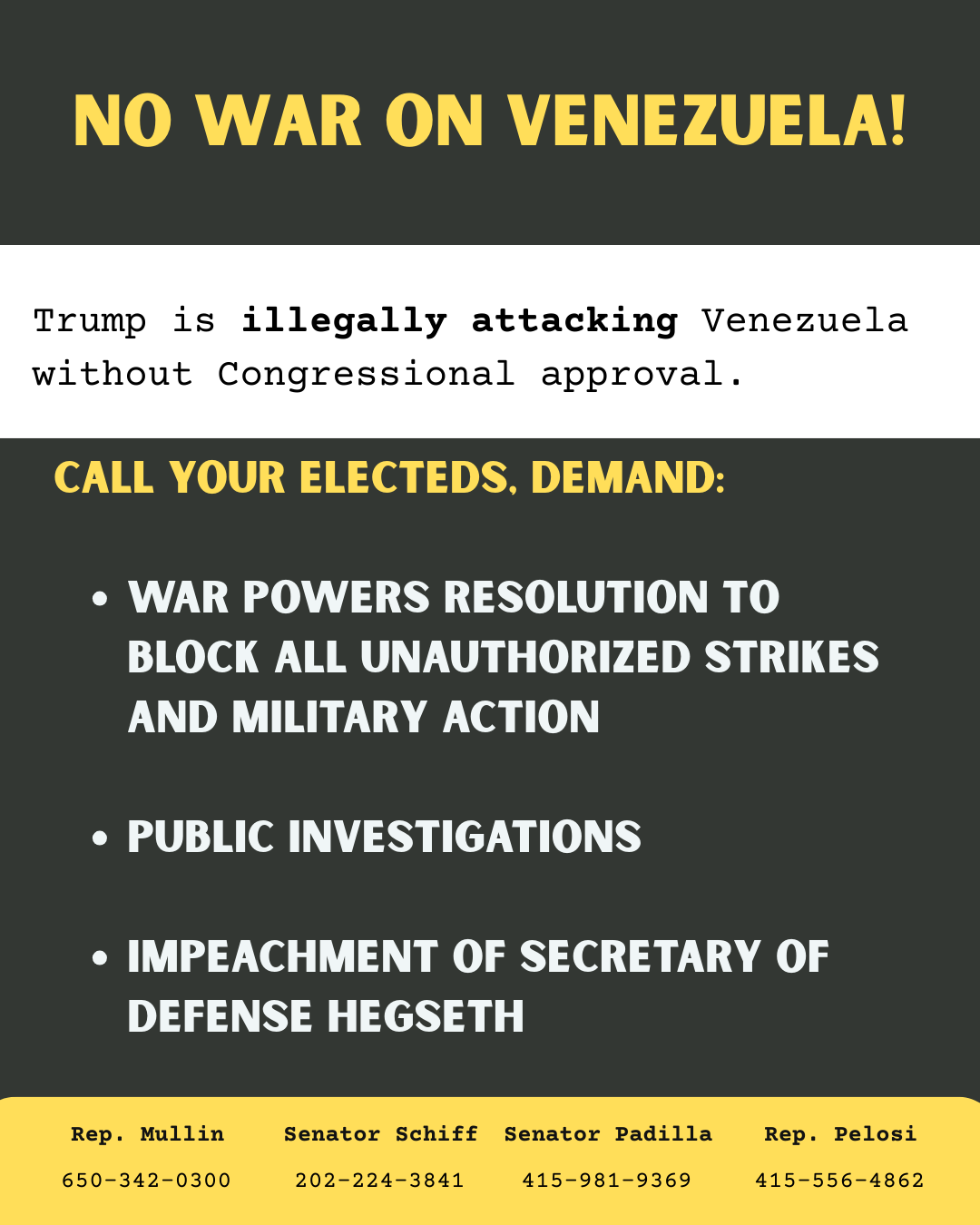Demand that our MoCs enact rules allowing them to continue governing while dispersed and sheltering in place.
Senator Dianne Feinstein
SF Office: (415) 393-0707
DC Office: (202) 224-3841
LA Office: (310) 914-7300
Fresno Office: (559) 485-7430
San Diego Office: (619) 231-9712
If you can't get through to one office, try another. There is no benefit to calling one office over another. Leaving a voicemail is as good as reaching a live person. Hate the phone? Resistbot is your friend.
Senator Kamala Harris
SF Office: (415) 981-9369
DC Office: (202) 224-3553
Sacramento Office: (916) 448-2787
LA Office: (213) 894-5000
San Diego Office: (619) 239-3884
Call the SF office first, but try the other offices if you can’t get through. If you can’t get a live person, leave a voicemail and also send a follow-up email written in your own words. Hate the phone? Resistbot is your friend.
Note: only one of the following two Congresswomen represents you. To find out which one, click here.
Speaker Nancy Pelosi
SF Office: (415) 556-4862
DC Office: (202) 225-4965
Call the SF office first, but try the DC office if you can’t get through. If you get voicemail, hang up and try a few more times to talk to a real person. Don’t give up! Short direct messages are most effective. Hate the phone? Resistbot is your friend.
Rep. Jackie Speier
San Mateo Office: (650) 342-0300
DC Office: (202) 225-3531
Keep calling if you don’t get through. Voicemails are logged daily into a central report across offices. Hate the phone? Resistbot is your friend.
Call Script
My name is __________. I am a constituent, and my zip code is _______. I am a member of Indivisible SF.
I strongly urge [the Representative/Senator] to immediately enact rules similar to those proposed by Swallwell, Crawford, and many others, permitting remote voting and work by members of congress. As you know, more than 50 members of Congress are already under self-isolation or quarantine. That number will surely grow, and social-distancing is clearly going extend through April and probably May. In a national emergency of this kind, continuity of government is a necessity.
Congress must be able to swiftly enact legislation, establish policies, make appropriations, and provide crucial oversight of the Executive Branch. In a global pandemic, effective government is an essential service, but unlike First Responders and healthcare workers who are putting their lives on the line, Congress can use modern technology to safely work and vote remotely. [The Representative/Senator] must enable it to do so.
Background
House and Senate rules currently prohibit members of Congress from casting votes remotely by video-conference or some other secure means. Those rules can be changed at any time by a majority vote in each chamber. The rules already allow members of congress to perform work outside DC, and Cold War national defense laws provide for convening Congress at alternate locations. Therefore, it's not a big or radical step to permit secure remote-voting during a national emergency via technologies that were not in existence a decade ago but are now in wide use.
Speaker Pelosi and other congressional leaders argue that remote voting is unconstitutional, raises security issues, and would require difficult and complex rule-changes that could only be enacted by an in-person session.
Constitutional Issues
The Constitution uses words like “meet” “assemble” “attend” and “present,” but nowhere is there any explicit requirement for MoC to be physically in the same space because until the 21st Century that was inherent in those words. But now, with modern technology those words can be interpreted differently. And all over the world businesses, institutions, and organizations have been conducting online meetings for years even though their charters, bylaws, and constitutions were written using language and concepts that predated such technology.
“Originalist” and “Strict Constructionist” conservatives have long argued that the Constitution has to be interpreted based on the original understanding of the founders at the time it was ratified. But liberals usually take a “Living Constitution” stand that the Constitution has to be interpreted in the context of current times and realities, even if such interpretation is different from the original assumptions at the time it was written. If times ever called for a Living Constitution it's during a global pandemic.
It's likely that there would be court challenges to any congressional action adopted via online methods – but so what? Almost everything Congress does is challenged by someone in some court on some grounds. House and Senate rules are internal congressional matters, and so far SCOTUS has pretty consistently ruled that they have no jurisdiction to intervene in congressional affairs. (Of course, those were mostly in cases where such rulings benefited the Republican Party.) Worst-case, allow remote-voting, fight it out in court for years while decisions go forward, and if in the end the unlikely occurs and the rule-change is deemed invalid by then the pandemic will (hopefully) be over and whatever legal complexities arise can be dealt with then.
Security Problems
While the “security” argument may initially sound impressive it doesn't hold water for very long. “National security” evokes concepts and emotions about troop movements, military strategies, and classified technologies – knowledge of which would aid an enemy. But how does that apply to domestic measures taken to address a health/economic emergency? Anyone with access to a news source knows what we (and everyone else on the planet) is facing. None of it is secret. The content of bills being voted on by Congress is already public knowledge. So the only thing confidential is their private conversations and deal-making. If a foreign adversary – or for that matter a domestic news reporter – was able to electronically eavesdrop on congressional deliberations that are usually conducted in back rooms, how does that compromise our national security?
Surely Congress can figure out how to have private online conversations. But if they can't secure their communications, then the worst that will happen is that they'll be politically embarrassed with their constituents. In this emergency, that seems a risk worth taking to maintain continuity of government.
Rule-Changes in a Time of Pandemic
Historically, Congress has always proven the old adage, “Where there's a will, there's a way.” When they want something done, they've always found a way to do it.
Last Thursday (3/23) the House Committee on Rules Office of the Majority issued a report “Examining Voting Options During the COVID-19 Pandemic”. It discussed a wide range of options for Congress continuing to function during the pandemic, including remote voting, provisional changes to quorum rules, paired-voting (as used to be the common practice), changes to Unanimous Consent, proxy-voting, and so on. All of the various options had complexities and problems, upsides and downsides, arguments for and against. But clearly there are options that could be considered – and that need to be considered promptly.
For an example of the kinds of possibilities examined in the report, if the barrier to changing the rules to allow remote voting is assembling a quorum to vote in the new rules, according to the report, clause 5(c) of rule XX was added to the rules in the wake of the 9/11 attack. It provides that if a traditional quorum cannot be achieved due to a “... natural disaster, attack, contagion, or a similar calamity rendering Representatives incapable of attending the proceedings of the House... ” the House can proceed with only those members who are able to return to the Capitol.
“Where there's a will, there's a way.”







